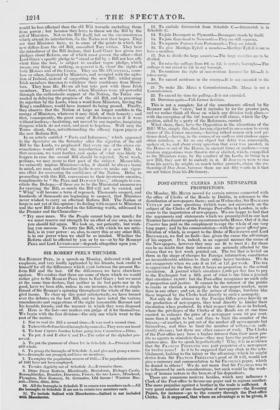SIR ROBERT PEEL'S THUNDER.
SIR ROBERT PEEL, in a speech on Monday, delivered with good emphasis, and very loudly applauded by his friends, took credit to himself for all the differences which exist between the present Re- form Bill and the last. Of the differences we have elsewhere spoken. We confess that there are some of them which we would rather give to Sir ROBERT PEEL than to Earl GREY; but we must at the same time declare, that neither in its bad parts nor in its good, have we been able, unless in one instance, to detect a single thread of Sir ROBERTS' spinning throughout the whole of the min- gled tissue. To clear up this point satisfactorily, we have turned over the debates on the last Bill, and we have noted the various amendments and suggestions of the right honourable Baronet and his humble friends, and the manner in which they were disposed of. Here is the list—our readers can judge of it for themselves. We begin with the first division—the only one which went to the root of the matter. SIR ROBERT PEEL, in a speech on Monday, delivered with good emphasis, and very loudly applauded by his friends, took credit to himself for all the differences which exist between the present Re- form Bill and the last. Of the differences we have elsewhere spoken. We confess that there are some of them which we would rather give to Sir ROBERT PEEL than to Earl GREY; but we must at the same time declare, that neither in its bad parts nor in its good, have we been able, unless in one instance, to detect a single thread of Sir ROBERTS' spinning throughout the whole of the min- gled tissue. To clear up this point satisfactorily, we have turned over the debates on the last Bill, and we have noted the various amendments and suggestions of the right honourable Baronet and his humble friends, and the manner in which they were disposed of. Here is the list—our readers can judge of it for themselves. We begin with the first division—the only one which went to the root of the matter.
1. Not to read the Bill a second time—It was read a second time.
2. To hear the disfranchised boroughs byeounsel—They were not heard
3. To hear Captain Gordon before going into Committee—Ditto.
4. To put A and B after C and D—The order of the alphabet pre- served.
5. To put the grammar of clause 1st in Schedule A—Priscian's head still whole.
6. To group the boroughs of Schedule A, and give each group a mem- ber—Boroughs not grouped, and have no members.
7. To employ the population returns of 1831—The population returns of 1831 have not been employed.
8. To take Appleby out of Schedule A—It remains there.
9. Ditto Great Bedwin, Bletchingly, Beeralston, Bishop's Castle, Boroughbridge, Bramber, Pownton, Fowey, the two Looes, Minehead, Plympton, New Romney, St. Germains, Old Sarum ! Wootton Bas- sett—Ditto, ditto, ditto.
10. All the boroughs in Schedule B to return two members each—All the boroughs in Schedule B are not to return two members each.
11. TO include Salford with Manchester—Salford is not included at kit Blanchester. 12. To exclude Greenwich from Schedule C — Greenwich is in Schedule C.
13. To join Devonport to Plymouth—Devonport stands by itself. 14. To join Gateshead to Newcastle—They are still separate.
15. To separate Portsea from Portsmouth—They are joined.
16. To give Merthyr-Tydvil a member—Merthyr-Tydvil is not to have a member.
17. Not to divide the large comities—The large counties are to be divided.
18. To raise the suffrage from 101. to 15/. in certain boroughs—The suffrage is not raised to 151. in any borough.
19. To continue the right of non-resident freemen for life—It is taken away.
20. To extend residence to the county—It is not extended to the county.
21. To make Mr. Moe& a Commissionera-Mr. _Voce is not a Commissioner.
22. To extend the time for polling—It is not extended.
23. Downton again—Vide former decision.
This is not a complete list of the amendments offered by Sir ROBERT and his "crew," but it includes by far the greater part, and we rather think all those on which any division took place,— with the exception of the 50/. tenant-at-will clause, which the Op- position, aided by a party of the Reformers, carried. What share, then, have the Opposition in the alterations of the Bill ? Why, simply this, that, having objected in succession to every clause of the former measure,—having talked reason sick and pa- tience dead,—having, in the course of an endless and aimless oppo- sition (aimless, so flr as any object but delay was concerned), spoken at, to, and about every question that ever was mooted, in the House or out of the House, in ancient times or modern—some random suggestions were thrown out or elicited, which, compelled as the Ministers were, by the conduct of the Lords, to bring in a new Bill, they saw fit to embody in it. If JOHNSON were to rise from his grate, lie might, on much better grounds, claim the au- thorship of. Don Juan, because there are not fifty words in it that are not taken from his Dictionary.


























 Previous page
Previous page